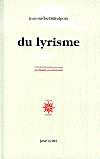About lyricism …
A critical essay by Jean-Michel MAULPOIX, published in March 2000, José Corti Publisher, in the series « Reading, writing … », about 430 p.
Presentation and preface
translated from the original French by Catherine Wieder
La Voix d'Orphée (Orpheus' Voice) was at the origin of such a volume, published under the same cover in 1989, to which I recently wished to add a few alterations for a new edition.
Believing it to be useful to feed it with a wider number of concrete information, liable to be used in order to understand better the concept of lyricism, at a time when the latter is the object of some kind of new interest, I added to the initial text several new chapters : on the history of neologism, on the ode, on the elegy, on inspiration and on the voice. Such additions soon became such that the initial text was twice as large : hence, a new book now comes to life …
When Orpheus Voice was first published, there were only very few people who took some pains in pondering over the concept of lyricism. The situation has now changed : As an evidence, I would quote the persisting return in multifold ways of that very term, « lyricism », for the last few years, in critical essays of some importance, such as Jean-Claude Pinson's Habiter en poète (Dwelling as a poet) (Champ Vallon, 1995), Dominique Rabaté's editing of Figures du sujet lyrique (The Figures of the lyrical subject) (PUF, 1996) and Martine Broda's L'amour du nom (The love of the name) (Corti, 1997) …
Less formalistic than their immediate elders, a new generation of poets, born for most of them in the 50's have otherwise come to find some new credit, in the past twenty years, to what has often been called « a new lyricism ».
What is the meaning of such a « return » ? Some wish to see in it but some kind of regression. a forgetting of the critical overhangs of modernity. A totally obliging abandon to subjective bursts, in a so-called post-modern time of total theoretical disorientation. Such an attitude pays no attention to what is essential, i.e. the renewal of the poetry of the voice, less fascinated as it becomes by the very process of writing than willing to be addressed to the Other, as well as to be articulated in a new way to any kind of otherness. If there does exist some new lyricism, then it belongs to the interval between the proper and the similar which has just settled itself, closely tight and knotted to the contemporary reformulation of the question of identity.
Yet, such a return to lyricism does not seem sufficient to turn into credibility, on the critical level, a notion that remains undoubtedly confusing since it has always been split between contradictory values. It may be even some kind of a vain task to deem to delineate it better. It seems to be almost too close to the emotional existence of the subject and his abuse of language. Lyricism plays with fire, one might say, and sometimes goes beyond the limits that one is aware of being dangerous. But, by doing so, it challenges, it is the most obscure part of the process of poetic creation and may be of our intimate relationship to language which it compells us to examine. Those who are aware of its threats as much as of its energy and beauty are indeed those who are unwillingly interested to lyricism.
Thus, is writing on lyricism undoubtedly ceaselessly oscillating between joining and refusal ? Now on the side of fervour, now on the side of suspicion. Now convinced. Now irritated. And it also means running the risk, at any time , to let oneself fall into such a state. In order to resist as much as possible such sudden changes of mood, above all I aimed at filling that work with new quotations and historical descriptions, only wishing to contribute thus to expand the understanding of a notion about which only each one of us will have his own conception.
Just one word, however, since today a debate is waged about poetry, about lyricism and about their relationship to the real. Just one word to spell it out.
Poetry deals with something else which the real strangles and to which it would wish to flutter. That very something else palpitates in it, however it may acknowledge impossibility. Far from fleeing towards the Azure, from keeping the Gods' nostalgia going or revel among dreams and lies, it aims at, scrutinizes, protests, claims, quotes all things to appear in the language it works at. The lyrical instinct calls up such an effort which through it aims at articulating the inside and the outside, the real and the subjective, or the possible and the impossible. It takes its measure and refrains from concluding.
The poet walks on the rope a few feet above the ground (enough to break his neck through a wrong move) in the half-way in between which is ours, between heaven and earth, since we are neither plants nor birds. Being lyrical, he takes the risk of falling or simply being ridicule. He always aspires to soaring even if this tightrope walk on the thin ropes of his sentences is from now on the ultimate kind of alleviation he may be capable of.
Today, I call lyricism such a path going, strictly speaking, nowhere, but all along which the walker is well aware of his own weight and vertigo.
Montainville, October 20. 1999.

